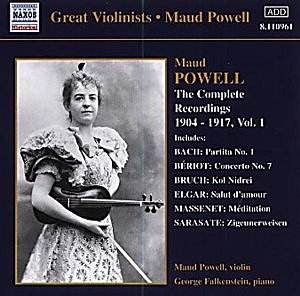I reviewed the second volume in Naxos’ Maud Powell
series some time ago
so won’t repeat some essential biographical material here . This earlier
volume however is entirely representative of her playing, ranging from
a session in April 1904 to one in June 1917 (she was born in 1867 and
died in 1920). Consistencies of tone, expressivity and technical control
run throughout these sessions and there is little here that lacks interest,
either musically or specifically violinistically.
Her Bach emerges once again as splendidly buoyant and
forward looking and her Gluck Minuetto somewhat less successful – with
some applied expressive vibrato in lyric passages and some rather unconvincing
slides. It’s a feature of her pre-turn-of-the-century playing – her
training was essentially concluded by 1890 – that vibrato usage wasn’t
constant and like many players of her generation she would use it as
an expressive device. The Orfeo Melodie in her own arrangement is alternately
sensitive and ardent but the on/off vibrato usage limits optimum expressivity
and the unimaginatively repetitious slides vitiate the tension of the
lyric line. A strange lack of differentiation in phrasing rather damages
the performance, odd in a musician so frequently alert to this kind
of thing. The Bériot redresses things in her favour; like her
lively Bach, this is far from academic College fodder; on the contrary
this is bold, slashing playing, wonderfully phrased with a strong architectural
sense and splendid bowing in the finale. It’s worth pointing out that
this piano-accompanied concerto was her most extended performance on
record - the first movement was recorded in June 1915 with George Falkenstein
– and the second and third followed a year later in June 1916 with a
change of pianist, this time the young Arthur Loesser.
Some surface chuffing accompanies Bruch’s Kol Nidrei
– and also considerable reserves of emotive sensitivity from Powell
– elasticity of phrasing, excellent double stopping and an aura of introspection
conveyed through serious and dedicated musicianship. She can certainly
get her fingers around Sarasate’s Zigeunerweisen (or at least the three-minute
extract from it) if without really the requisite tone, and Elgar’s Salut
d’amour is nicely and unsentimentally done. That tricksy bit of Americana,
the Bellstedt-arranged Caprice on Dixie is well played technically
but though athletic it is rather dry toned. Danks’ Silver Threads
Among the Gold, beloved of sobbing cellists throughout the 78 era
(take a bow W.H. Squire), is rather noncommittal and tonally impoverished
once more whilst Herbert’s Petite Valse is much better, neat
and stylish. Her technique withstands the demands of Sauret’s Farfalla
but things sink again with some more dry playing in Vieuxtemps’ Polonaise,
the earliest performance here, dating from 1904 and Drdla’s Guitarrero
which is disappointing. The same composer’s Souvenir is stately,
slow and dry and her own arrangement of the Minute Waltz is arch
and silly. It’s a shame that the majority of poorer items are contained
in the final couple of furlongs of this disc and that we end with another
of her poor performances, Massenet’s Elegie, dry, lacking opulence,
with dubious portamenti it simply can’t withstand the competition of
the newly emerging tonalists from Russia and the central European players.
The series has been transferred by Ward Marston who
has worked on the series he produced for the Maud Powell Foundation
over a decade ago. They were both tapes and CDs and exactly matched
these new Naxos CDs. It’s a mistake not to have issued them in chronological
session order and not to have found better copies of those sides that
caused problems last time around – and still do to an extent here. That
said this is a series of major importance because Powell was a major
violinist. No history of the Violin on Record is in any sense complete
without her and I commend the series.
Jonathan Woolf



 Maud Powell (violin)
Maud Powell (violin)  NAXOS 8.110961 [71.56]
NAXOS 8.110961 [71.56]